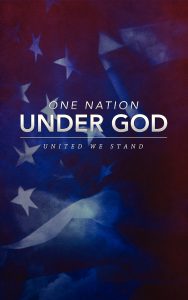human obligation precedes social obligation
Secular liberalism is a religion with a vision that demands superseding all other religions whereby its enlightened members can use the power of the state to create heaven on earth. As there is no God, no soul, no eternal life beyond the grave, they argue that it is up to those so enlightened to create and lead mankind into a utopian earthly paradise here and now.

Under God
Chief among the obstacles set before secular liberals is our Judeo-Christian heritage and biblically-based beliefs in the separation of church and state. And yes, the Bible, the Old Testament tells us so. When the people of Israel demanded a king, the prophet and priest Samuel was told by the Lord to choose Saul and to anoint him king. When Samuel anointed Saul king he also “explained to the people the law of royalty and wrote it in a book, which he placed in the presence of the Lord.”[1]
Samuel made it perfectly clear to the people that the Lord was not pleased with their demand for an earthly king and admonished them “Now you have the king you want, a king the Lord has given you. If you fear the Lord and worship him, if you are obedient to him and do not rebel against the Lord’s command, if both you and the king who rules you follow the Lord your God—well and good. But if you do not obey the Lord and if you rebel against his command, the Lord will deal severely with you and your king, and destroy you.”[2]
The law of royalty, in essence defined the distinction between Church and state. It is the Christian belief that the Bible is the inspired Word of God and therefore the authoritative source for right living, including the relationship between church and political power, that lays in the way of secular liberalism. “The distinction between church and state arose within Christianity, and nowhere else, because of the accepted authority of the Bible.”[3]
This distinction has served as a principle for over two millennia: “As long as the emperor (or later, king, prince, duke, and so forth) believed that he had an immortal soul and believed that the church had power to grant eternal life in heaven, there would be a distinction between church and state. Moreover, as long as the church retained the power to determine believers’ eternal destiny, then the church would ultimately be more important than the state because eternal bliss dwarfs temporal existence; or, to put it in the negative, eternal damnation outweighs any temporal success.”[4]
James Madison, in his 1785 “Memorial and Remonstrance against Religious Assessments”, wrote: “It is the duty of every man to render to the Creator such homage and such only as he believes to be acceptable to Him. This duty is precedent, both in order of time and in degree of obligation, to the claims of Civil Society.”
“Religious liberty, in this view, is therefore not quite a liberal liberty. It is not a freedom to do what you want, but a freedom to do what you must. It describes a duty of society to retreat and give its members space to act on what they deem essential; an acknowledgement not of human liberty or right, but of a human obligation that precedes the social obligation and so shapes it.”[5]
[1] 1 Sm 10:25.
[2] 1 Sm 12:13-15.
[3] Benjamin Wiker, Ph.D. Worshipping the State: How Liberalism Became Our State Religion, March 25, 2013, Regnery Publishing.
[4] Ibid.
[5] Yuval Levin, The Perils of Religious Liberty, First Things, February 2016, pp. 32-33.
